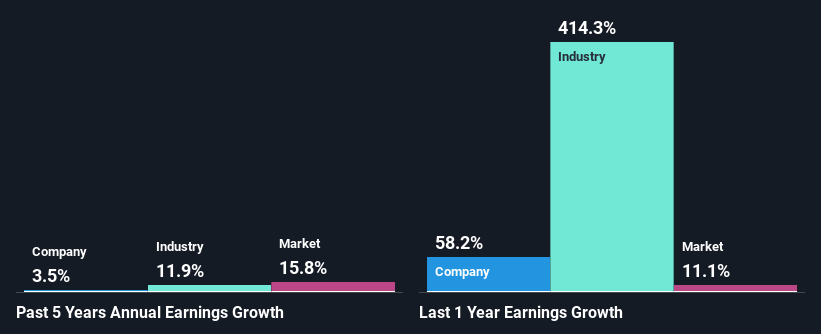Do Its Financials Have Any Role To Play In Driving Beach Energy Limited's (ASX:BPT) Stock Up Recently?
Beach Energy (ASX:BPT) has had a great run on the share market with its stock up by a significant 11% over the last three months. Given that stock prices are usually aligned with a company's financial performance in the long-term, we decided to study its financial indicators more closely to see if they had a hand to play in the recent price move. In this article, we decided to focus on Beach Energy's ROE.
Return on equity or ROE is an important factor to be considered by a shareholder because it tells them how effectively their capital is being reinvested. Simply put, it is used to assess the profitability of a company in relation to its equity capital.
See our latest analysis for Beach Energy
How Do You Calculate Return On Equity?
ROE can be calculated by using the formula:
Return on Equity = Net Profit (from continuing operations) ÷ Shareholders' Equity
So, based on the above formula, the ROE for Beach Energy is:
14% = AU$501m ÷ AU$3.5b (Based on the trailing twelve months to June 2022).
The 'return' is the amount earned after tax over the last twelve months. So, this means that for every A$1 of its shareholder's investments, the company generates a profit of A$0.14.
What Is The Relationship Between ROE And Earnings Growth?
Thus far, we have learned that ROE measures how efficiently a company is generating its profits. Depending on how much of these profits the company reinvests or "retains", and how effectively it does so, we are then able to assess a company’s earnings growth potential. Generally speaking, other things being equal, firms with a high return on equity and profit retention, have a higher growth rate than firms that don’t share these attributes.
A Side By Side comparison of Beach Energy's Earnings Growth And 14% ROE
To start with, Beach Energy's ROE looks acceptable. Even so, when compared with the average industry ROE of 21%, we aren't very excited. On further research, we found that Beach Energy's net income growth of 3.5% over the past five years is quite low. Not to forget, the company does have a decent ROE to begin with, just that it is lower than the industry average. Hence there might be some other aspects that are keeping growth in earnings low. These include low earnings retention or poor capital allocation.
Next, on comparing with the industry net income growth, we found that Beach Energy's reported growth was lower than the industry growth of 12% in the same period, which is not something we like to see.
The basis for attaching value to a company is, to a great extent, tied to its earnings growth. It’s important for an investor to know whether the market has priced in the company's expected earnings growth (or decline). By doing so, they will have an idea if the stock is headed into clear blue waters or if swampy waters await. If you're wondering about Beach Energy's's valuation, check out this gauge of its price-to-earnings ratio, as compared to its industry.
Is Beach Energy Making Efficient Use Of Its Profits?
Beach Energy has a low three-year median payout ratio of 10% (meaning, the company keeps the remaining 90% of profits) which means that the company is retaining more of its earnings. However, the low earnings growth number doesn't reflect this fact. So there might be other factors at play here which could potentially be hampering growth. For example, the business has faced some headwinds.
Additionally, Beach Energy has paid dividends over a period of at least ten years, which means that the company's management is determined to pay dividends even if it means little to no earnings growth. Upon studying the latest analysts' consensus data, we found that the company's future payout ratio is expected to rise to 15% over the next three years. Despite the higher expected payout ratio, the company's ROE is not expected to change by much.
Summary
On the whole, we do feel that Beach Energy has some positive attributes. Yet, the low earnings growth is a bit concerning, especially given that the company has a respectable rate of return and is reinvesting a huge portion of its profits. By the looks of it, there could be some other factors, not necessarily in control of the business, that's preventing growth. Having said that, looking at the current analyst estimates, we found that the company's earnings are expected to gain momentum. Are these analysts expectations based on the broad expectations for the industry, or on the company's fundamentals? Click here to be taken to our analyst's forecasts page for the company.
Have feedback on this article? Concerned about the content? Get in touch with us directly. Alternatively, email editorial-team (at) simplywallst.com.
This article by Simply Wall St is general in nature. We provide commentary based on historical data and analyst forecasts only using an unbiased methodology and our articles are not intended to be financial advice. It does not constitute a recommendation to buy or sell any stock, and does not take account of your objectives, or your financial situation. We aim to bring you long-term focused analysis driven by fundamental data. Note that our analysis may not factor in the latest price-sensitive company announcements or qualitative material. Simply Wall St has no position in any stocks mentioned.
Join A Paid User Research Session
You’ll receive a US$30 Amazon Gift card for 1 hour of your time while helping us build better investing tools for the individual investors like yourself. Sign up here

 Yahoo Lifestyle
Yahoo Lifestyle 
